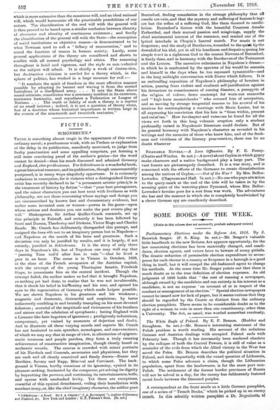FICTION.
SClioNBRUNN.*
THERE is something almost tragic in the appearance of this extra- ordinary novel ; a posthumous work, with no Preface or explanation of the delay in its publication, manifestly unrevised, to judge from faulty punctuation and some appalling misprints, yet forming a still more convincing proof of the author's genius—for the word cannot be denied—than his much discussed and admired Germany and England, also posthumous. For Schonbrunn is a wonderful book, a great historical romance, and its publication, though unaccountably postponed, is in many ways singularly opportune. It is extremely audacious in conception, for it violates what a distinguished literary critic has recently declared to be "a permanent artistic principle in the treatment of history by fiction "—that "your best protagonists, and the minor characters you can best treat with liveliness as with philqsophy, are not those concerning whose sayings and doings you are circumscribed by known fact and documentary evidence, but rather some invented men or women—pawns in the game—upon whose actions and destinies you can make the past events play at will." Shakespeare, Sir Arthur Quiller-Couoh contends, set up this principle in Falstaff, and certainly it has been followed by Scott and Dumas, Thackeray and Dickens, Victor Hugo and Charles Reade. Mr. Cramb has deliberately disregarded this precept, and assigned the beau role not to an imaginary person but to Napoleon— and Napoleon at the zenith of his fame and greatness. Such a deviation can only be justified by results, and it is largely, if not entirely, justified in Schonbrunn. It is the story of only three days in Napoleon's life, but of Napoleon one may well say that ** panting Time toil'd after him in vain "—that he lived a year in an hour. The scene is in Vienna in October, 1809, at tho close of the French occupation of the Austrian capital, with the attempt of the young Thuringian fanatic, Friedrich Stops, to assassinate him as the central incident. Though the attempt failed, the author makes us feel that it brought Napoleon, as nothing yet had done, to realize that he was not invulnerable, that it shook his belief in histestiny and his star, and opened his eyes to the regeneration of Germany which made Leipsic possible. We are shown Napoleon in his greatness and his weakness ; magnetic and daemonic, distrustful and suspicious; by turns indiscreetly confiding in and brutally trampling on his most devoted followers ; scornful of the ineptitude and viciousness of his brothers and sisters and the adulation of sycophants ; hating England with
a Lissauer-like hate begotten of ignorance ; prodigiously industrious, unrepentant, yet visited by momenta of dejection and doubt. And to illustrate all these varying moods and aspects Mr. Cramb has not hesitated to coin speeches, monologues, and conversations, of which we may say that in range of view, in alternation of epigram- matic terseness and purple patches, they form a truly amazing achievement of constructive imagination, though closely based on authentic records. The canvas is crowded with minor portraits
of his Marshals and Generals, secretaries and physicians, but they are each and all clearly conceived and firmly drawn—Duroc and Berthier, Savory and Rapp, Meneval and Corvisart. The back- ground is Vienna, hardly conscious of its ignominy, cynical in its pleasure-seeking, fascinated by the conqueror, yet salving its dignity by boycotting the parvenu, and continuing its entertainments, balls, and operas with unabashed levity. Yet there are exceptions, resentful of this cynical_ detachment, veiling their humiliation with mordant irony, or, like the chief imaginary character, the soldier-poet • Sclignbrunn a Novel. By J. A. Crumb e• J. A. Revermort '1, Author of Germany sod England. &c. New York and London G. P. Putnam's Sons. [68. net.] Rentzdorf, finding consolation in the strange philosophy that all creeds are vain, and that the mystery and suffering of human brings are but the reflex of a suffering God, like them doomed to annihi- lation. Rentzdorf's liaison with the beautiful Countess Amalie Estherthal, and their mutual passion and misgivings, supply the chief sentimental interest of the romance, and remind one of the lyrical interlude in Chopin's funeral march. For music is not forgotten; and the study of Beethoven, wounded to the qui& by the downfall of his idol, yet in all his loneliness and despair opposing his simple trust in a righteous God to the cosmic Nirvana of Rentzdorf, is finely done, and in harmony with the Beethoven of the Testament and the Letters. The narrative culminates in Napoleon's dream— in which he is confronted by the spectres of his would-be assassin and himself in the days when he _too espoused tyrannicide—and in the long midnight conversation with Duroc which follows. It is an enthralling exposition of Napoleon's philosophy of heroism in action, passing from violent and exultant self-justification against his detractors to consciousness of coming disaster, a panegyric of the religion of valour, fierce contempt fot worn-out monarchs and " high-born mountebanks " who accused him of usurpation, and so moving by strange tangential courses to his avowal of his motives for contemplating a marriage with Marie Louise, but in all expressing his conviction that his fate is "from within, present and res:st'ess." How far chapter and verse can be found for all the views set forth in this long volcanic eruption only a student profoundly versed in Napoleonic literature could declare. But of its general harmony with Napoleon's character as revealed in his writings and the memoirs of those who knew him, and of the fresh- ness and vividness of the literary presentation, there can be no doubt whatever


































 Previous page
Previous page